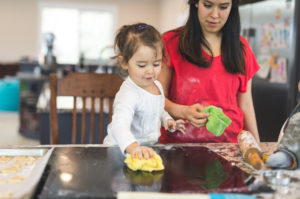How Parents Can Foster Autonomy and Encourage Child Development
 To gather information about the parent-child relationship, I often ask parents, “If you could wish for one thing for your child, what would that wish be?” I might also ask,“What do you want for your child as they transition into adulthood?”
To gather information about the parent-child relationship, I often ask parents, “If you could wish for one thing for your child, what would that wish be?” I might also ask,“What do you want for your child as they transition into adulthood?”
Exploring a parent’s wishes for their child can help increase understanding of the parent-child relationship. This is important whether you are working with parents in a school setting or in private work.
Generally, the responses I hear do not vary all that much. Parents say they want their child to be “happy” and experience “success.” When I push parents to define what these things look like, things can get interesting. Through a parent’s definition of “happiness” and “success,” I often learn more about their family values, approaches to parenting, and the pressures a child may be experiencing.
Parents often ask me if they answered “correctly” or how I would answer the same question. I share my own greatest goal for children: That, as they transition into adulthood, they possess the skills to be empathetic and independent adults.
How can we help children become independent adults? An essential step toward accomplishing this goal is educating parents about the self-determination theory and autonomy-supportive parenting.
The Self-Determination Theory
The self-determination theory explains the three basic psychological needs people need to fulfill:
- Autonomy, or the need to feel free to choose their own behavior
- Competence, or the need to feel capable of effectively interacting with their environment
- Relatedness, or the need to feel close to and meaningfully connected to others
It’s important for these needs to be supported by a child’s environment in order for them to emotionally evolve and develop in a healthy way. A positive family environment can promote and support a child’s basic psychological needs. On the other hand, a negative family environment can hamper healthy psychological development (Deci and Ryan, 2000).
Autonomy-Supportive Parenting
How can we help children become independent adults? An essential step toward accomplishing this goal is educating parents about the self-determination theory and autonomy-supportive parenting.
Parents can practice autonomy-supportive parenting by creating an environment that supports autonomy. Parents who support the development of autonomy are involved in their child’s life but encourage independence and problem-solving skills. It’s important for parents to give children both age-appropriate autonomy and agency. By doing so, they help them develop at an appropriate level. This can have the effect of greater emotional well-being.
When children are autonomous, they are more likely to feel capable of making their own healthy choices. By supporting children in the development of autonomy and agency, parents also help children learn about family values, social norms, and essential rules.
Parents can support the development of autonomy by:
- Providing a rationale and explanation for family rules and behavior expectations. When children and adolescents understand reasons for rules and the context behind them, they have an easier time supporting and following those rules.
- Labeling and validating a child’s feelings and perspectives. Validating feelings is an essential component of mental health and growth. By normalizing emotions, parents can help them understand that everyone has challenging moments. This also helps children learn that strong feelings are nothing to be ashamed of.
- Minimizing judgement and control. Many parents may try to control their kids. Psychologist Dr. Ross Greene recommends parents try to influence children instead. Parents who attempt to control children can become dependent on power-oriented strategies. By adopting a more collaborative parenting style, as Greene suggests, parents make room for children to develop greater autonomy. This in turn helps children develop the skills necessary to become independent adults.
- Allowing children to make choices. By providing age-appropriate opportunities for children to make independent choices and decisions, parents are giving them a healthy sense of agency and control.
- Supporting growth and new challenges by scaffolding and practicing new skills with children. In construction, scaffolding helps supply extra support to the building being erected. When the building is finished, the scaffolding is removed, and the structure is able to stand independently. Parents who use scaffolding education offer children similar support. Scaffolding skills incorporate information and skills children already have. This approach helps foster greater autonomy and independence.
- Letting children solve problems on their own. Parents often feel as if they should swoop in and rescue their child when they encounter a challenge. But when problems arise, it’s often better to brainstorm together and list possible solutions to the challenge at hand. Offer guidance when needed but encourage youngsters to problem-solve independently.
- Letting children struggle (safely). Every child encounters failure at some point. Trying and making mistakes or failing is part of growth. If children do not develop healthy coping mechanisms around failure, they are more vulnerable to anxiety. It is essential for parents to model that failure and making mistakes are essential parts of the learning process. By letting children learn from their mistakes, we are giving them an important opportunity to develop resilience, grit, confidence, and coping skills.
If you want to learn more about how you can help your children develop autonomy, please reach out. A counselor trained in child and family counseling can offer support and guidance.
References:
- Deci, E. L., & Ryan R. M. (2000). The ‘what’ and ‘why’ of goal pursuits: Human needs and the self-determination of behavior. Psychological Inquiry, 11(4), 227–268.
- Greene, R. W. (2017, August 15). Raising human beings: Creating a collaborative partnership with your child. New York, NY: Scribner.